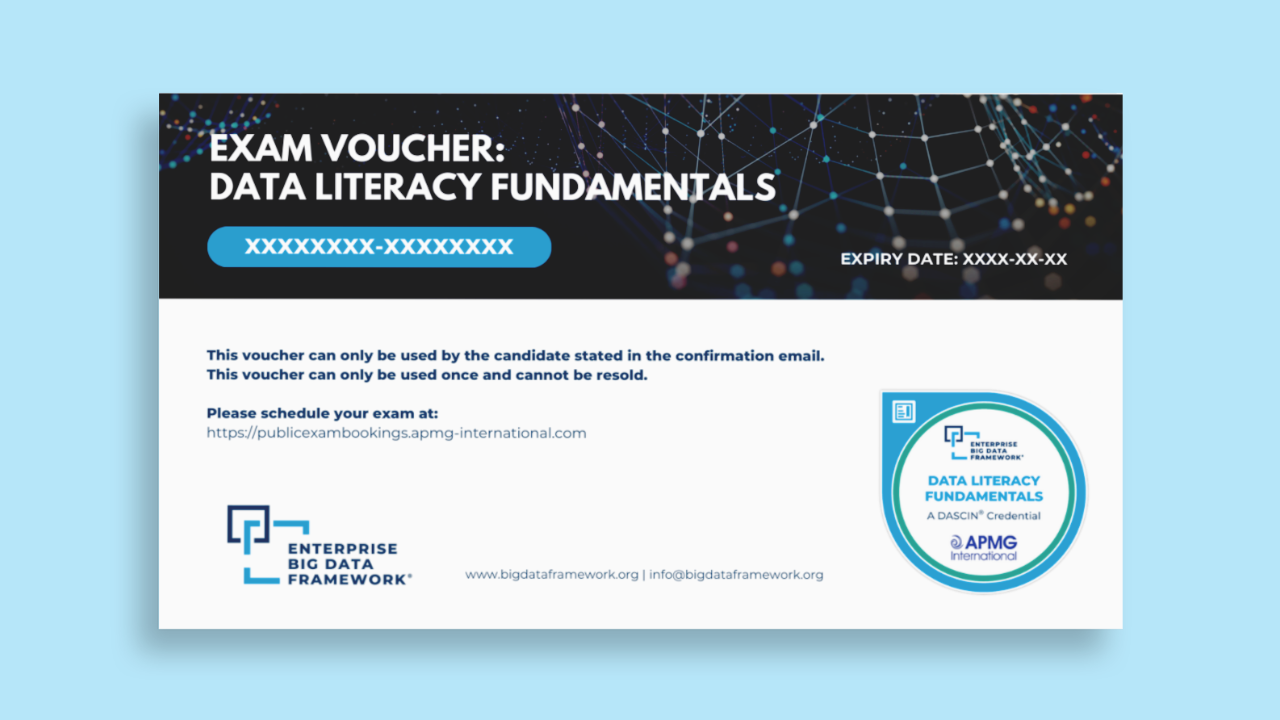Course Summary
The Data Literacy Fundamentals Course is designed to provide participants with a comprehensive introduction to the world of data, equipping them with the essential skills and knowledge to navigate today’s data-driven environments. Beginning with the basics, the course covers foundational concepts such as data types, structures, and the importance of data quality. Participants will learn to interpret and analyze data visualizations and reports, empowering them to extract meaningful insights and uncover patterns and trends. Through hands-on exercises and real-world examples, learners will develop a strong understanding of descriptive statistics, data grouping, and other essential analytical techniques.
The course goes beyond analysis, addressing critical topics like data governance, privacy, and ethics. Participants will gain insights into best practices for managing data responsibly, complying with regulations, and understanding the ethical implications of data usage. Additionally, the course emphasizes the role of data in decision-making processes, teaching learners how to apply data insights to solve problems and support strategic goals. By focusing on clear and effective communication, participants will also build the skills to present their findings to non-technical audiences using accessible language and visual tools.
To round out the learning experience, the course introduces participants to a range of data tools and technologies, from spreadsheets to data visualization software, ensuring familiarity with practical tools for analysis and reporting. It also provides guidance on accessing and leveraging internal and external data sources to enhance decision-making. By the end of the course, participants will have a strong foundation in data literacy, enabling them to confidently engage with data in diverse professional contexts and contribute to informed, ethical, and data-driven decisions.
detailed course Information
The learning objectives of the Data Literacy Fundamentals Certification include:
- Understanding Basic Data Concepts: Gain foundational knowledge of key data concepts and terminology, including data types, data structures, and the importance of data quality.
- Data Visualization and Reporting: Develop the ability to read and interpret data visualizations and reports, enabling you to extract meaningful insights from graphical representations of data.
- Basic Data Analysis Techniques: Learn basic data analysis methods, such as descriptive statistics and data grouping, to identify patterns and trends in datasets.
- Data-Driven Decision Making: Understand how data is used in decision-making and problem-solving processes, and how to apply data insights to support business strategies.
- Communicating Data Findings: Build the skills to communicate data findings clearly and effectively to non-technical stakeholders, using accessible language and visual tools.
- Accessing and Using Data Sources: Gain knowledge of various data sources, including internal and external datasets, and learn how to access and use them for analysis.
- Data Ethics: Understand the ethical implications of data usage, including transparency, fairness, and privacy, and the importance of ethical decision-making in data analysis.
- Familiarity with Data Tools: Become familiar with common data tools and technologies, such as spreadsheets and data visualization software, to analyze and present data.
These learning objectives are designed to equip candidates with the essential skills and knowledge required to navigate data environments and make informed, data-driven decisions. The Data Literacy Fundamentals Certification ensures a solid foundation in data literacy, enabling participants to build the confidence and competence needed to engage with data in a variety of professional contexts.
The Data Literacy Fundamentals Certification is a structured, interactive program designed to build a strong foundation in understanding and working with data. The course is divided into distinct modules, each focusing on key aspects of data literacy and delivered through engaging sessions tailored for practical application.
Module 1: The Importance of Data Literacy
- Understanding the role of data literacy in today’s digital world
- Exploring the impact of data-driven decision-making on organizations
- Recognizing the value of data as an asset for personal and professional growth
Module 2: Fundamental Data Concepts
- Introduction to essential data concepts, including data types and structures
- Importance of data quality and how it affects analysis and decision-making
- Overview of key terminology and foundational principles of working with data
Module 3: Describing Data Sets
- Techniques for summarizing and describing data using basic statistics
- Identifying patterns, trends, and relationships within datasets
- Hands-on practice with grouping and interpreting data
Module 4: Data Visualizations
- Principles of effective data visualization and chart selection
- Learning to read, interpret, and create impactful visual representations
- Practical tips for designing clear and compelling data visualizations
Module 5: Storytelling with Data
- Understanding the importance of narrative in communicating data findings
- Techniques for translating data insights into actionable stories
- Best practices for presenting data to non-technical audiences
Module 6: Data Ethics
- Exploring ethical considerations in data usage, including transparency and fairness
- Understanding privacy regulations and responsible data management practices
- Applying ethical principles to ensure integrity in data-driven decisions
This course provides participants with the knowledge and skills needed to confidently interact with data in various professional contexts, enabling them to make informed, ethical, and impactful decisions.
The Data Literacy Fundamentals Certification is designed for a broad audience seeking to enhance their understanding and ability to work with data in a professional context. The course is ideal for:
- Business Professionals: Managers, analysts, and team members who rely on data to drive decisions and improve business outcomes.
- Students and Graduates: Individuals looking to build foundational data skills to prepare for careers in data-driven industries.
- Non-Technical Stakeholders: Professionals in roles such as marketing, sales, finance, or human resources who need to interpret and communicate data insights effectively.
- Entry-Level Data Practitioners: Individuals new to the field of data and analytics who want to develop a strong starting point for further specialization.
- Educators and Trainers: Teachers and corporate trainers aiming to incorporate data literacy concepts into their programs.
- Leaders and Executives: Decision-makers seeking to understand the role of data literacy in driving strategic initiatives and fostering a data-driven culture within their organizations.
This course is tailored for anyone eager to confidently engage with data, whether for personal development, professional advancement, or organizational impact, regardless of their technical background.
The Data Literacy Fundamentals course concludes with an official APMG Examination, designed to validate the participant’s understanding of fundamentals data concepts. This structured assessment ensures that learners have grasped the foundational knowledge required to work with data confidently. Below are the key details about the examination:
- Material Allowed: This is a closed book exam. Study materials, including the course guide, are not permitted during the examination.
- Exam Duration: The exam is 60 minutes long. Candidates taking the exam in a language other than their native or working language receive an extra 25% of time, extending the duration to 75 minutes.
- Marks and Scoring: The exam consists of 40 multiple-choice questions, each worth 1 mark. There is no negative marking, and unanswered questions will receive no marks. To pass, participants must score 26 marks (65%) or more. An elevated pass mark of 30 marks (75%) is required for individuals aspiring to become trainers.
- Complexity: The exam includes questions at Bloom’s Levels 1, 2 and 3. Bloom’s Level 1 focuses on recalling facts, terms, and basic concepts, such as defining data structures or identifying its key components. Bloom’s Level 2 requires grasping the meaning of concepts, such as explaining how machine learning differs from data analysis. Bloom’s Level 3 involves using acquired knowledge in practical contexts, such as determining which visualization is best to convey a message.
This examination is designed to confirm that participants have achieved a solid foundation in Data Literacy, enabling them to apply their knowledge effectively and confidently in real-world scenarios.
Digital Badge

Testimonials & Course Reviews
This course was a game-changer for me. Even though I had some experience with data, the modules on storytelling and ethics really stood out. They gave me the tools to present my findings more effectively and handle data responsibly. Highly recommend it to anyone looking to strengthen their data foundation
I’ve always felt intimidated by data, but this course broke it down in a way that was easy to follow. The section on data visualizations was especially helpful – it’s already changed how I create and read reports. Thanks to this course, I feel more confident in using data to support my marketing strategies.
The course provided a solid foundation for understanding how to make data-driven decisions. As a leader, I appreciated the practical examples and clear explanations, especially around data ethics and privacy. This has helped me approach data strategy with more confidence.
I took this course to build my data skills for a new role, and it exceeded my expectations! The modules on basic data analysis techniques and visualizations were incredibly useful. I now feel better prepared to success in my new job. Thanks Jan!
What I loved most about this course was the focus on ethical data usage and governance. In my work, these topics often come up, and this course gave me the confidence to guide clients on best practices. It’s an essential certification for professionals in any field, and I like that this is a short course that goes in-depth. Next year, I will enroll in one of the other data science programs.
Right from the start, the course broke everything down in a way that was easy to understand. I wasn’t intimidated by technical jargon, and I appreciated how the fundamentals of data types, structures, and data quality were explained so clearly. Honestly, I wish I had learned this stuff earlier in my career.
All in all, this course was a fantastic investment in my professional development. It struck the perfect balance between theory and practical application. I’d like to thank Jan, the instructor, for making the course engaging and accessible. You can tell he really cares about helping students succeed, and I walked away feeling more confident in my ability to work with data, and ready to tackle new challenges. If you’re on the fence about taking this course, I say go for it.
As a policy analyst working in government, I often deal with data but never felt fully equipped to analyze or interpret it to its fullest potential. The Data Literacy Fundamentals Certification Course changed that. The course covered everything from basic data concepts to more advanced techniques like data visualization and ethics.






